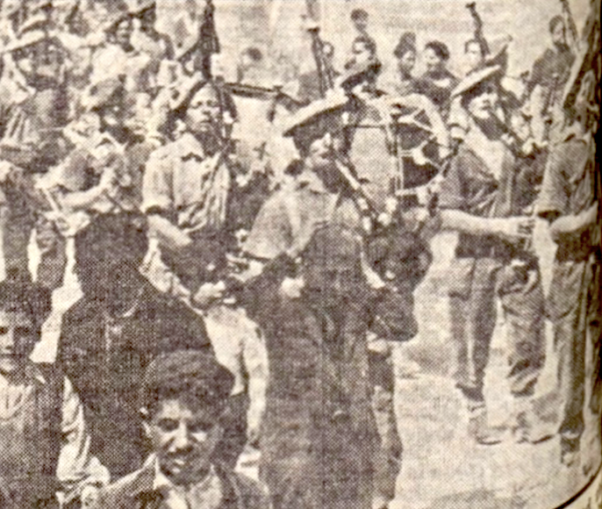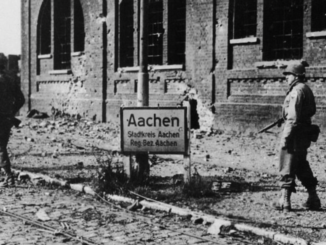“In his seventh and final article JOHN ALLDRIDGE writes of Tunis and the triumphant end of a campaign.” – Manchester Evening News, November 23 1949
Tunis, Monday
I thought I saw a ghost in Tunis last night. He came swinging down the crowded Avenue Jules Ferry, his boot-tips striking sparks from that fashionable pavement.
His luxuriant moustaches stretched almost from ear to ear. His badges of rank showed through ragged holes in the shoulders of his khaki pullover.
He was capless; and knotted carefully-careless into the open neck of his shirt was a coloured silk scarf.
Here, you would have said, watching him thread his way with an almost insolent ease through the crowd — here is the perfect desert soldier, as we knew him in ’43.
He might have posed for one of those immortal “Two Types,” those cartoon characters who were to the men of the Eighth and the First what Bairnsfather’s “Old Bill” was to an earlier generation of British fighting man.
But, unlike “Old Bill,” the humour of the “Two Types” was totally unintelligible to the outside world: to an outsider it might have seemed oddly arrogant, strangely bitter.
For an Army cut off from home for months and years develops in time a separate way of life, a life complicated by its own private slang language, by a private code of behaviour, which decides more rigidly than any civilian code what is and what is not done…
But my ghost turned out to be very solid flesh and blood. He was a young Service Corps subaltern on a joy-ride — or, as we used to say, a “swan” – from Benghazi, five hundred miles farther east.
He was making his way home to Cheshire and Civvy Street the long way round.
Talking to him later over coffee, it was strange to realise that he was still at school when these same cafe tables swarmed with men so very like him; that El Alamein and Longstop must seem as remote to him as Waterloo and Marathon.
For he was so very much the type; he even spoke the same language.
To take a look around to him was “to shufti around.” When the time came to say goodbye it was first the bastard Arabic “say-eeda,” then the Neapolitan “chow.”
He was full of grateful praise for the colonial French and the Arabs he had met on the way.
“They were no end decent,” he said. “Once they had recognised the old uniform there was nothing they wouldn’t do for you.”
That merely confirmed something I had already discovered for myself — not only here in Tunisia but earlier in Italy — that wherever the British soldier passed in the last war he left friends behind.
It’s a pity that “Britain’s best ambassador” inevitably became a recruiting cliche, because that is exactly what he is.
And if you really want to find out how British stock stands abroad today you should forget for once the “informed quarters” of Paris and Rome and Cairo.
You should take your inquiries to the new red farmhouses around Caen; to any of a hundred tumbledown villages on the long slog up from Taranto to Venice.
Mention that you served with the Armee Britannique or with the Soldati Inglesi and from out of a drawer where it has been kept wrapped carefully in tissue paper will come the thumbed and dog-eared photograph of some broadly-grinning “Jock” or “Chalky” or “Paddy.”
How many times in this past fortnight have I been asked whether I knew some Private Smith or Fusilier Jones who, were he to return, would be welcomed like the prodigal son?
There are whole villages out here who will remember the name of some obscure British private soldier long after that of his General is forgotten — simply because he could play the piano accordion like an angel (if angels play piano accordions) and had a way with him that stopped the children’s tears and made sad old ladies smile.
So it was here in Tunis. And so it is today.
For Tunis, so often conquered, remembers that the British came here as liberators. And that is another word that seems to have gone out of common use north of the Mediterranean — liberator.

Youngsters crowd round the liberating British troops led by the pipers,
Unknown photographer – © Newspapers.com 2024, reproduced with permission
Of course, there were some here whose smile of welcome was palpably strained — the rich landowners, the wealthy industrialists, the proprietors of the large hotels — in whose eyes liberation could be counted only by so many olive groves destroyed, by so many acres of farmland chewed up and trampled by our tanks.
But there was nothing false or sycophantic about the tears of pure joy that poured down the cheeks of the ordinary folk of Tunis, French and Arab alike, on that radiant May afternoon when the armoured patrols of the 11th Hussars and the Derbyshire Yeomanry raced each other into the city.
The shooting was to go on for a day or two more, as Von Arnim dragged his weary, dispirited, hordes up Cape Bon to the “Dunkirk” that never came off.
But actually the war in Africa finished here on that sun-drenched afternoon: finished so suddenly, so unexpectedly, that the enemy was caught sitting at his ease drinking a last aperitif in the cafes of the Avenue de Bardo.
There were to be other scenes like this. Other cities were to be liberated in the years that followed.
But Tunis was the first. And no other city was ever to offer such a dramatic last act as this.
If ever a long war left one unforgettable memory it is that of a German colonel taken prisoner in a barber’s chair, with the napkin still tucked under his chin and one half of his face still lathered.
For the First it was “hail and farewell”: after Tunis the best of its troops were absorbed into the Eighth. And the Eighth, who at first had secretly despised them as a parade-ground army, beautifully equipped but not good enough for the desert, was glad indeed to have them.
But here and there, still, you will find traces of the First: in the “Out of Bounds” signs on the walls of the ancient Souk (where every other cafe advertises — in Arabic — iced Coca-Cola and where even the cobblers work cross-legged under florescent lights); in the battle blouses and khaki denim trousers that seem to have become as much a national costume here as the burnous; in the dilapidated back bedrooms of the Tunis Palace, probably the most requisitioned hotel in the world.
It was in a shadowy corner at the end of one long corridor in that seedy caravanserai that I found a tattered poster still clinging:
“No liquor is allowed in the bedrooms. Guests are requested to turn off the lights before going to sleep.”
That, too, sounded very like the First having one last dig at the Eighth.
Reproduced with permission
© 2024 Newspapers.com
Note: More information about “Two Types” and “Old Bill” can be found at –
Jerry F 2024



